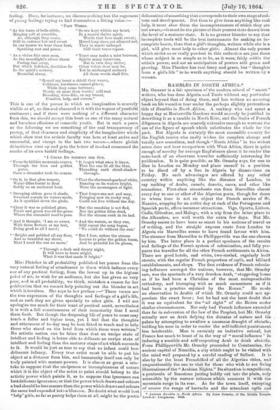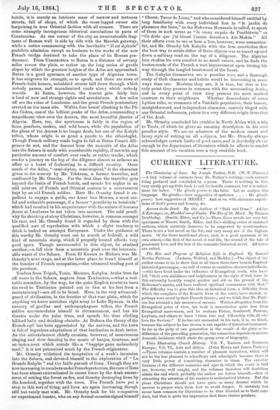RAMBLES IN NORTH AFRICA.*
Ma. ORMSBY is a fair specimen of the modern school of " smart" writers, who has done Algeria and Tunis without any particular object beyond that of doing them, and has written an amusing book on his vacation tour under the perhaps slightly pretentious title of Rambles in North rifrica. A cockney who had spent a happy day at Il•oshervi1Ie Gardens would scarcely be justified in describing it as a ramble in North Kent, and the limits of French diligences in Algeria are scarcely extensive enough to warrant the Use of the figure of speech which substitutes the whole for the part. But Algeria is certainly the most accessible country for the English tourist who really wishes for complete change and totally new sensations, and though " North Africa" in the widest sense does not bear comparison with West Africa, there is quite enough of novelty for average Englishmen about it to render' the note-book of an observant traveller sufficiently interesting for publication. It is quite possible, as Mr. Ormsby says, for one to dine in London on Monday and place oneself in a position to be dined off by a lion in Algeria by dinner-time on Friday. No such advantages are offered by any other country within anything like the distance of London, to say nothing of Arabs, camels, deserts, oases, and other like sensations. First-class steamboats run from Marseilles almost every day to one or other of the Algerian ports, though for those to whom time is not an object the French service of St. Nazaire, stopping for an entire day at each of the Portuguese and Spanish ports, offers immense attractions. Vigo, Oporto, Lisbon, Cadiz, Gibraltar, and Malaga, with a trip from the latter place to the Alhambra, are well worth the extra few days. But Mr. Ormsby seems to have been as smart in his notions of travel as of writing, and the straight express route from London to Algeria via Marseilles seems to have found favour with him,. The steamer from Marseilles to Phillippeville was the one chosen by him. The latter place is a perfect specimen of the results and failings of the French system of colonization, and fully pre- pares the traveller for all the other French settlements in Africa. There are good hotels, and white, two-storied, regularly built streets, with the regular French proportion of cafés, and billiard establishments, and shops. The first evidence of French coloniz- ing influence amongst the nations, however, that Mr. Ormsby saw, was the spectacle of a very drunken Arab, "staggering home as if he had been a Christian of the most unimpeachable orthodoxy, and hiccuping with as much earnestness as if it had been a practice enjoined by the Koran." He made an observation in Arabic of which Mr. Ormsby could not ap- preciate the exact force ; but he had not the least doubt that it was an equivalent for the "all right" of' the Briton under similar circumstances. Not only had French influence extended thus far in subversion of the law of the Prophet, but Mr. Ormsby actually saw an Arab defying the dictates of nature and his palate by attempting to swallow a nauseous draught of absinthe, holding his nose in order to render the self-inflicted punishment less intolerable. Man is certainly an imitative animal, but France has much to boast of in the way of " moral influence " in inducing a sensible and self-respecting Arab to drink absinth-8. From Phillippeville Mr. Ormsby proceeded to Constantine, the ancient capital of Numidia, a city which ought to be visited with the mind well prepared by a careful reading of Sallust. It is also by far the least Frenchified of all the Algerian cities, and unquestionably the one to visit for those who wish to see living illustrations of the "Arabian Nights." Its situation is magnificent, a peninsula of limestone jutting boldly out into the plain, only accessible by the narrow isthmus which connects it with the mountain range in its rear. As for the town itself, excepting of course the range of barracks and the attendant cafes and • Autumn R.rnbIes is North Africa. By John Ormsby, of the Middle Temple. Louden : Louipmias. 1884. hotels, it is merely an intricate maze of narrow and tortuous streets, full of shops, of which the cross-legged owner sits bargaining is true Oriental fashion with all corners. There are some strangely incongruous historical associations in parts of Constantine. At one corner of the city an unmistakeable frag- ment of Roman wall is side by side with the Moorish gateway, while a notice commencing with the inevitable "It est defends" prohibits admission except on business to the works of the new French bridge destined to take the place of its Roman pre- decessor. From Constantnia to Batna is a distance of seventy miles across the plain, or rather up the long series of gentle slopes by which the greatest heights of the Atlas are approached. Batna is a good specimen of another type of Algerian town. it has outgrown its strength, so to speak, and there are rows of French-built houses, unhabited streets laid down through which nobody passes, and macadamized roads along which nobody travels. At Batna, however, the tourist gets fairly into a land of new and strange sights and associations. A few miles off are the ruins of Lambessa, and the great French penitentiary erected on the same site. Within four hours' climbing is the Pic des Mires, one of the loftiest peaks of the Atlas, commanding a magnificent view over the Auress, the most beautiful district of Algeria. Here, too, the sportsman is fairly in the region of lions, panthers, snakes, and wild boars, while the population of the glens of the Auress is no longer Arab, but one of the Kabyle tribes, whose origin is so great a puzzle to the ethnologist. Though French military roads begin to fail at Batna French dili- gences do not, and the descent from the summits of the Atlas into the Sahara is made with considerable rapidity, if not with any particular amount of comfort over roads, or rather tracks, which render a journey on the top of the diligence almost as arduous an affair as a burst of foxhunting in a difficult country. Once south of the Atlas, " semi-alpine, semi-tropical," is the character given to the scenery by Mr. Tristram, a former traveller, and confirmed by Mr. Ormsby. For the first time the traveller, gets beyond the limits of French hotels, and spends his nights in an odd _mixture of French and Oriental custom in a caravanserai kept by an old French soldier. Here Mr. Ormsby found it ex- pedient to engage a. guide, one Amer ben Mousse, a most use- ful and estimable personage, if a former proclivity to homicide" which had resulted in his aCquaintance with the nature of travaux forces at Lambessa be not taken into account. The said procli- vity for shooting at stray Christians, hciwever, is common amongst his race, and Mr. Ormsby found it regarded by them with the qualified sort of reprobation with which a slight tendency to drink is looked on amongst Europeans. Under the guidance of this worthy Mr. Ormsby went out in search of feshtall, a wild kind of mountain sheep, which if properly hunted affords very good sport. Though unsuccessful in this object, he attained anotber,—a full view from a mountain peak over the intermin • able waste of the Sahara. From El Kantra to Biskara was Mr. Ormsby's next stage, and at the latter place he found himself at the frontier of French occupation,—the advanced trading post of the province.
Traders from Tripoli, Tunis, Morocco, Kabyles, Arabs from far off oases in the Sahara, negroes from Timbuctoo,—what a veri- table sensation, by the way, for the quiet English tourist to have the road to Timbuctoo pointed out to him at his feet from a mountain toph—are all to be found. Here, in the very advanced- guard of civilization, in the frontier of that vast plain, which for anything we know stretches right away to Lake Nyanza, in the country of gorillas and anthropophagous tribes, the French soldier accommodates himself to circumstances, and has his theatre under the _palm trees, and spends his time clicking billiard balls and drinking absinthe. At Biskara the theory of the French café has been appreciated, by the natives, and the town is full of ingenious adaptations of that institution to Arab tastes. As the entertainment chiefly consists, however, of monotonous singing and slow dancing to the music of banjos, tomtonas, and an instrument which' sounds like a "bagpipe gone melancholy mad," it is not patronized much by the French originators.
Mr. Ormsby withstood the temptation of a week's incursion into the Sahara, and devoted himself to the exploration of " La Grande Kabylie " and the futile pursuit of lions. Though they are now increasing in numbers under French protection, the race of lions has been almost exterminated in recent times by the Arab amuse- ment of setting the forest on fire, and thereby destroying lions by the hundred, together with the trees. The French have put a stop to this sort of thing,' and lions are again increasing, though still but rarely met with. Mr. Ormsby took for his companion an experienced hunter, who on any formal occasion signed himself
" Cheret, Tneur de Lions," and who considered himself entitled by long familiarity with every individual lion in " le jardin de plaisance des lions," as the Mahowna Mountain is called, to speak of them in such terms as "le vieux coquin de Ponthievre," or "Ce dr8le que j'ai blesse Pannee derniere It Ain Mokta." All their efforts even to see or hear a lion, however, were unsuccess- ful, and Mr. Ormsby left Kabylia with the firm conviction that the best way to attain either of these objects was to travel up and down a military road on the top of a diligence. The Algerine lion studies his own comfort to no small extent, and he finds the beaten roads of the French a vast improvement upon forcing his way through the tangled brushwood of the forest.
The Kabyles themselves are a peculiar race, and a thorough study of their character and habits would be interesting in more ways than one. Moslems they are, it is true, but that is the only point they possess in common with the surrounding Arabs, and in every point of view they present the most marked contrast to their neighbours. Whether descendants of som e Lybian tribe, or remnants of a Vandalic population, their honest, straightforward, and independent character, scarcely tinged with any Oriental influences, points to a very different origin from that of the Arab.
Mr. Ormsby concluded his rambles in North Africa with a trip to Tunis, of which he gives an amusing description in his own peculiar style. We are no admirers of the modern smart and funny style of writing on all subjects, but Mr. Ormsby always acknowledges certain limits of good taste, and is decidedly cle ver enough in the department of literature which he affects to render this account of his vacation tour a very readable book.































 Previous page
Previous page